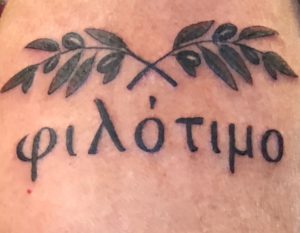When the rain stops falling in the Catalina Foothills, my father-in-law takes me outside to smell creosote.
He gestures broadly to the vast desert before us: “All that’s glistening is creosote,” he says, and leans over the adobe wall bordering his property, picks a small clump of leaves from a tree, puts them to my nose. “Smell that.”
As I’m inhaling creosote, he asks, “Have you ever done anything that would keep you off the Supreme Court?”
We’re in the wake of the Kavanaugh appointment, and my father-in-law is a retired judge.
“Oh, maybe . . .”
“What?” he prods, smirking. “Drink too much beer?”
I shrug.
“My guess is you’re pure as the driven snow.”
I laugh, but now, despite having no such ambitions, I’m left wondering what I’ve done that would keep me off the Supreme Court.
My father-in-law is Greek, second generation. His grandfather did a long, meandering, miserable, stint in the first World War – left home as a teenage soldier and returned an adult, a stranger to his own parents. When the Greek army courted him for a second tour, he left for New York where he made shoes; his progeny would become engineers for the federal government, judges, lawyers, teachers and CEOs of hospitals.
My father-in-law was born in the Bronx and describes himself as a “feral child” who disobeyed his parents and fell obnoxiously in love with his teachers. He blames his hearing loss on his love of loud rock ‘n’ roll. At 67, retired from the superior court bench, he got his first tattoo– olive branches above Greek lettering: φιλότιμο.
Or, in English, philotimo.
Philotimo is beyond English translation. Derived from the Greek “filos” — for friend — and “timi” — for honor — the word also encompasses taking pride in yourself, your family, your community, doing the right thing.
“It’s sort of like ‘be a mensch,’” my father-in-law explains.
He doesn’t mention that this untranslatable word is also the highest of Greek virtues.
The tattoo is beautiful — both in design and meaning.
In Tucson, my wife and I go to the tattoo shop where my father-in-law got philotimo. My wife is thinking of having the same done, a nod to her father, her heritage, the sentiment itself.
After breast cancer surgery at 34, I was told, among other things, that I could never have a tattoo on my left arm, and though I’ve wanted a tattoo, my limited canvas always causes me to hesitate.
However, when I walked into that tattoo shop in Tucson I knew I wouldn’t be leaving without ink. Tattoo shops throb with impulsive energy – a “you’re-not-here-for-a-long-time-but-you’re-here-for-a-good-time” vibe that’s deeply contagious.
This, I suppose, is why tattoo parlors are the site of countless bad decisions.
We met the woman who’d done my father-in-law’s tattoo – short, mid-50s, messy hair, oversized clothing. She’d recently had gallbladder surgery and proudly patted her abdomen through her roomy t-shirt, spared us none of the laparoscopic details.
“Gallbladder is one of those prehistoric organs,” I commented. “Only there to cause us trouble.”
While my wife opted only for a touchup on a pre-existing tattoo, I chose a design I’d seen on the whiteboard in my classroom. Last year, during creative writing class, a student rushed in, breathless; she’d just seen a “monogram of the entire English alphabet,” and the whole class watched as she drew it on the board, thrilled by the discovery. “Here is the A and here is the Q . . .”
Her joy was exhilarating.
Every letter, every symbol with which we could express ourselves, in English, was neatly, albeit cryptically, represented. The structure reified the strangeness of the written word.
After the tattoo artist had meticulously measured and sketched every inch of the monogram, she applied the stencil to my skin, had me stand up, take a look in the mirror.
The design moved when I moved. I grimaced.
Foolishly, I expected stasis.
“They move different on everyone,” she explained. “They’re responding to who you are. They tell a story about who you are right now, and later they’ll tell a story about who you’ve become.”
I was sold.
As she prepared the machine, she asked me if I was in the medical field.
I laughed. “No, I’m an English teacher.”
“Oh, I just thought because what you said about the gallbladder . . .”
“I collect random bits of information,” I told her. “I think the spleen is a prehistoric organ, too. Don’t ask me why I know this.”
I have a high pain threshold; this I know from lots of nasty medical experiences dating way back to the 1980s. All the jabs and probing and cutting haven’t been painless — I’ve just come to accept that as entities comprised of flesh and brain, hurt is part of our lot. Wincing or flinching doesn’t alter or lessen pain, and what’s often mistaken, in me, for stoicism is merely pragmatism.
Tattoo pain is a medical pain, but sans the psychological pain, sans the existential, mortal dread, tattoos don’t hurt; the tattoo is chosen pain, with no outcome but the one you have decided upon. (Provided, of course, you don’t contract Hep C.)
I could feel the searing arc of every circle, the burning dig of every edge, but there was no tension in me, no dread of the outcome, no uneasy anticipation of discovery, and so the pain was a valve opening and emitting a cloud of exquisite, transcendent, uncomplicated hurt.
And from that hurt a permanent reminder of a student’s joy, of the English language in its entirety, A’s, Q’s and all. Situated within the frame of this monogram, the letters look as foreign as the Greek lettering on my father-in-law’s arm.
“Love of honor” is the simplest, most modern English translation of philotimo, but the panoply of virtues the word expresses cannot be contained in four syllables. The word is utterly untranslatable, and I love that there are words that remind us of language’s limitations, remind us that many things can only be accurately conveyed through action, pain and joy.
That said, I peddle the Modernist view of poetry, tell my creative writing students that poetry exists to “express the inexpressible” . . . as in we must use letters, words, text, to express what letters, words and text cannot otherwise express.
Recently, in a poem, a student wrote, “Just because/ you’ve done a wrong thing/doesn’t mean you’re bad.” I paused on the lines — though not expressing the inexpressible, they made me think again of my father-in-law’s question, “Have you done anything that would keep you off the Supreme Court?” I’ve let people down, hurt feelings and, yes, I’ve drunk too much beer; would that America lived up to its ideals, this question would be a fantastic litmus test for our own basic decency, but right now it feels impossible.
Instead I consider the letters on my arm, trace the outline of philotimo in the English alphabet on my skin, and wonder how I might better use my words, better live up to some beautiful, ancient, untranslatable virtue.


